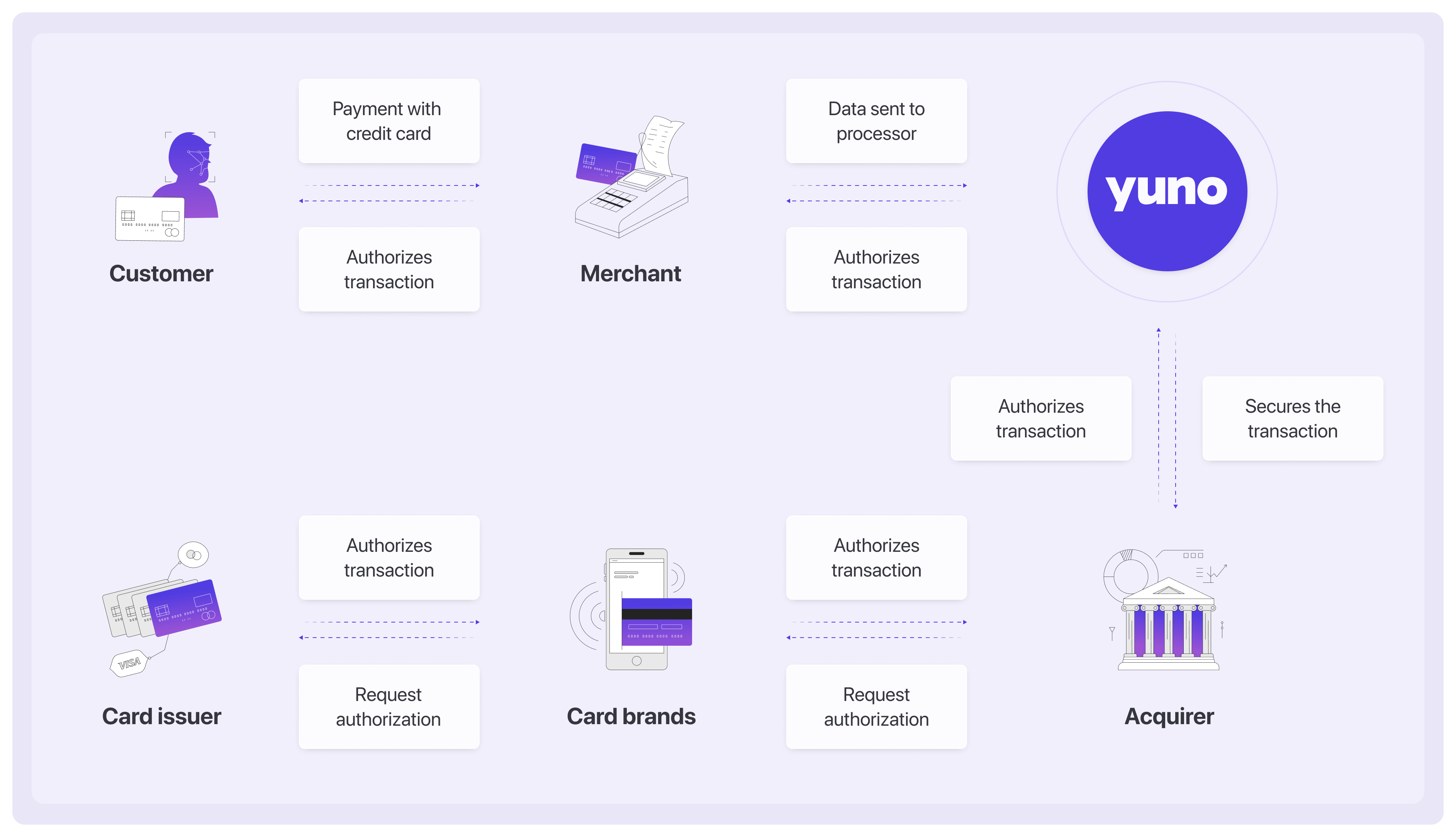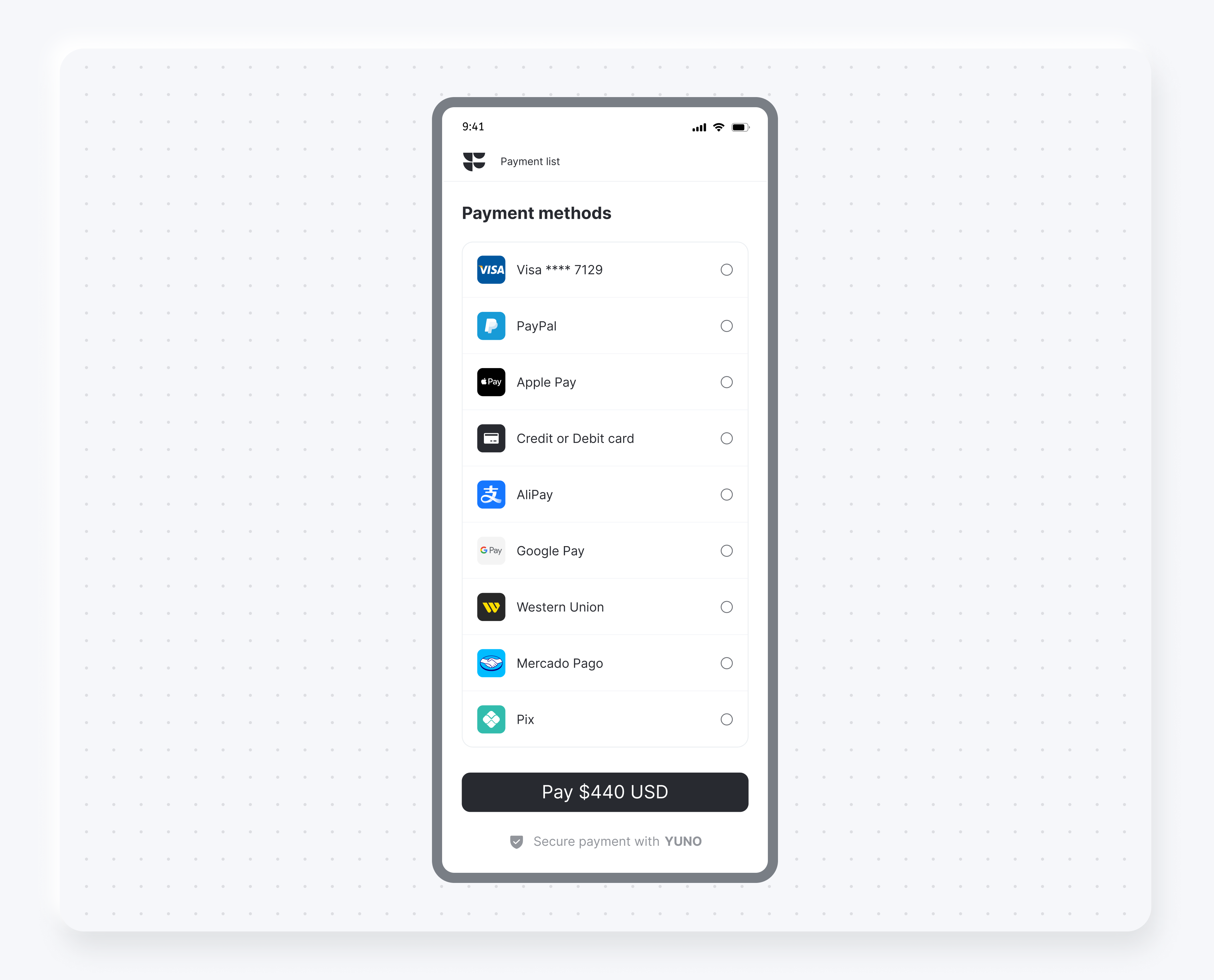PCI Compliance
The user payment experience is related directly to how safe they feel when using your platform to make a payment. Clients are more likely to buy from merchants that keep their sensitive data safe, protecting users from cyber theft and fraud. Therefore, becoming PCI compliant makes you closer to a better user experience and gaining clients’ trust.
Yuno Solution
With Yuno's PCI-DSS Level 1 solution, you can securely tokenize your customers' payment information, reducing your PCI scope and ensuring data protection.
Tokenization involves collecting sensitive payment details and generating a short-term, single-use token representing this information. Yuno handles and secures sensitive payment data, thereby maintaining PCI compliance on your behalf. Tokenization offers the following advantages:
- Enhanced checkout experience: By storing payment methods as tokens, your customers can enjoy a smoother and faster checkout process.
- Support for subscription and recurring payments: Tokenized payment methods can be easily utilized for recurring payment scenarios, enabling seamless subscription billing.
- User control over sensitive information: Yuno enables users to manage their saved cards, giving them control and visibility over sensitive payment information.
Yuno simplifies the process of making payments across different providers by tokenizing users' payment information. This means you only need to store a single token, making future payment transactions easier.

What is PCI compliance?
The Payment Card Industry Data Security Standard (PCI DSS) is a set of rules which merchants that store, process, or transmit cardholder data must follow. The PCI DSS aims to reduce payment card fraud by establishing the payment ecosystem's foundational security. Your business must meet the requirements and continually document and remediate processes handling cardholder data to be PCI compliant. Governments do not supervise PCI-compliant observance, but card brands can penalize merchants that are not in compliance.
Who must be PCI compliant
Any enterprise processing, transmitting, or storing individuals’ card data, no matter the size or number of transactions effectuated annually, must be PCI compliant. Therefore, if your business accepts cards as a payment method, it must follow the PCI rules. You still need to be certified even if your operation is based on a third-party solution to handle cardholder data. However, the compliant process is significantly simplified using third-party solutions like Yuno.
PCI compliance levels
As a consequence of the company's variety and transaction volume, four PCI compliance levels were defined. Depending on the level of compliance the companies fit, a different amount of security validation is required. The four PCI compliance levels are:
- Level 1: process more than 6M debit or credit card transactions annually
- Level 2: process between 1M-6M transactions annually
- Level 3: process between 20K-1M transactions annually
- Level 4: process less than 20K transactions annually
While Level 1 merchants must undergo an internal audit performed by an authorized Qualified Security Assessor (QSA) once a year, other level merchants usually have to submit an Annual Self-Assessment Questionnaire (SAQ).
How To Become PCI Compliant
The PCI Security Standards Council developed the requirements to become PCI compliant. There are 12 essential requirements, but depending on the compliance level, you may be required to meet each of the 400+ security controls associated with base requirements, directives, and test procedures. The vast list of conditions involves components to ensure the safety regarding card data handling and storing, as well as annual validation cycles to control and provide the necessary security level.
How Yuno helps you remain PCI compliant
At first sight, the list of PCI requirements might seem complex and time-consuming, but the process is very straightforward. You can count on Yuno's help to ensure your cybersecurity, reputation, and long-term sales. Become PCI compliant!
Using Yuno solutions, the transaction and cardholder data are tokenized. Therefore, merchants no more store or transmit card data through their system, dealing only with non-sensitive data. It is possible because cardholder data are replaced with a unique string of numbers, while Yuno safely stores and processes the sensitive data.
Since your business reduces the contact and exposure of cardholder data, the PCI compliance process is simplified. Instead of an internal audition, you have to complete a questionnaire. Thus, your business saves costs and offers customers a more secure payment experience.
Using a third-party service like Yuno, you will probably be required to fill out the SAQ A or SAQ D. If all cardholder data functions are outsourced, and your business systems or premises do not store, process, or transmit cardholder data, you would probably need to fill out the SAQ A, composed of 22 questions. On the other hand, if your business does not use outsourced systems and stores card data, you would probably need to fill out the SAQ D, composed of 329 questions.
In the case of your business integrating the Yuno Direct Flow, you must share an Attestation of Compliance (AOC) signed by your company and a certified auditor.
Take advantage of Yuno solutions
To leverage the capabilities of Yuno's PCI-DSS Level 1 solution, you can utilize one of our integration options based on Yuno SDKs. Choose from Full Checkout, Lite Checkout, and Secure Fields, each offering unique features to suit your specific requirements. These SDKs are available for both mobile and JavaScript versions. For detailed information on Yuno's SDKs, please refer to the SDK guide.

Where you can find more information
For further information, you can use the PCI official page, where you will find complete documentation regarding data security standards. In addition, you can go directly to the PCI Document Library to download the SAQ Instructions and Guidelines and the last versions of the SAQ self-assessment questionnaires.
Updated 24 days ago